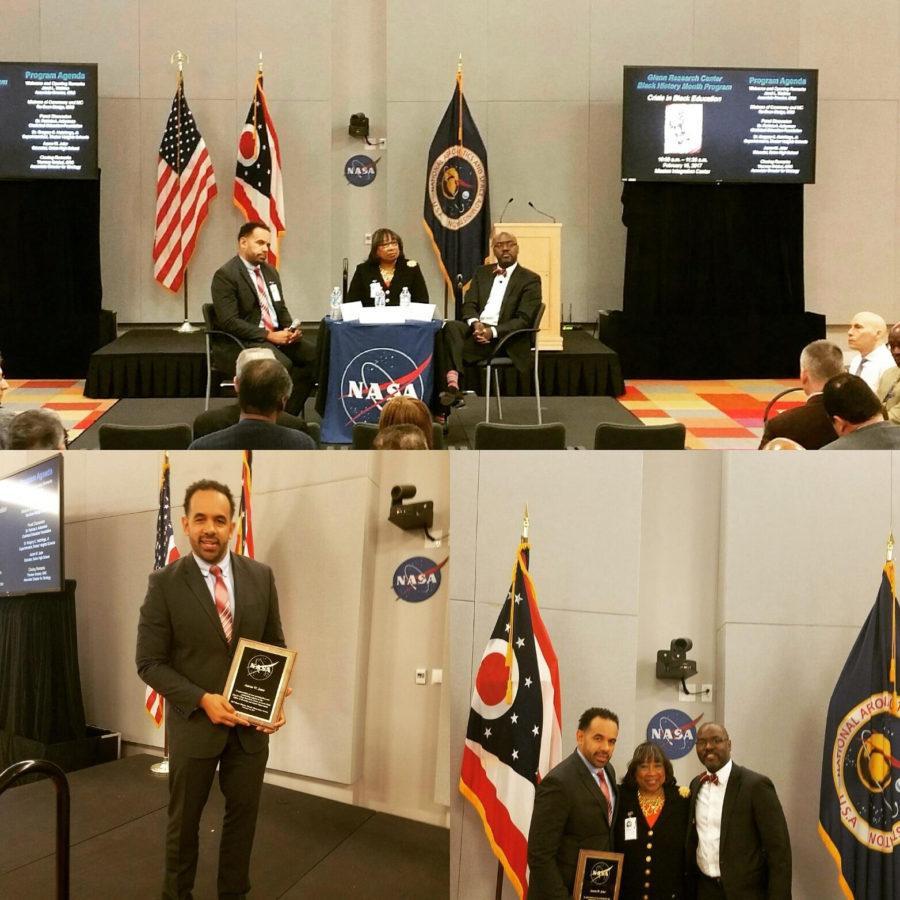SHS teacher, administrator, student comment on crisis in minority education
SHS teacher Aaron Jeter speaking on the NASA panel about the crisis in black education.
Looking back at the course of American history, there has always been a gap in the education system for minorities. In 1954, the United States Supreme Court ruled on Brown v. Board of Education, allowing the integration of public schools across America. Many advocates have been speaking out about the gap in the education system for African Americans prior to Brown v. Board, and they’re still speaking out about it now due to the fact that the racial issues involving the case is still prevalent. For the existing issues to be fixed, they must first be acknowledged.
Solon High School AP Psychology, sociology and World History teacher Aaron Jeter was invited to speak at a NASA panel about the gap for minorities in education in honor of Black History Month. A friend of Jeter’s has connections with NASA, and they asked Jeter to speak as a representative of SHS and of minority groups.
“To speak on the panel was very humbling,” Jeter said. “Historically, African Americans didn’t have many options of careers to go into, but today the law has changed. More African Americans have chosen other professions, and as a result, not as many are choosing to go into the field of education due to the opportunities that have opened up. So now there’s a shortage in the education system as a result.”
Shortening the gap is easier said than done. A key issue is reaching out to minority teachers and hiring them as often as non minorities are hired. Assistant Principal Joshua Frazier spoke on how he thinks Solon does a good job of promoting diversity and why he felt there was a lack of minority teachers in education in other schools, and how fixing that problem will take hard work and dedication from everyone involved.
“I think if districts want to diversify their staff, they need to be deliberate in their approach,” Frazier said. “They need to actively recruit minority teachers, and they need to value that. But if people don’t really want that, they’re not going to go out of their way to make sure that it happens. But if you really want to recruit, you need to go to the teachers and colleges and open up your networks in order to truly diversify the staff.”
Reaching out to minorities in educational settings doesn’t only mean reaching out to teachers, but to students as well. With SHS’s student diversity, the administration tries to reach out to all students, and encourages them to challenge themselves in AP level classes. Junior Nadia Carr, who is currently enrolled in AP Psychology, shared how she thought more minority students could get involved in education .
“Many students have different minds, and [a lot of kids] need more help and attention than what they are getting,” Carr said. “Teachers need to tend [more to the students who are struggling] and be supportive of all types of students. The teachers should be helping and encouraging their minority students to take on harder level classes.”
Fixing the disparity in education for minorities, involving both teachers and students, is a process that will take many years and a huge amount of dedication to solve. There are many theories as to why the gap exists, and multiple solutions for fixing it, but Jeter said he thinks that people need to take a step back and look at the big picture. Although making a change will be a challenge, it is not impossible. Jeter spoke at NASA primarily to bring awareness to the still widening gap in the education system for minorities. Just by simply speaking on the panel, Jeter himself has become part of the change that he, and many others, are fighting for.
“When you look at the crisis in black education, it’s both structural to historical,” Jeter said. “There is also a cultural aspect to it as well. Who knows why some cultures value education differently. You need to look at all aspects, it can’t just be one or the other. The reasons are very complex, and you need hard work to really make a change.”
















